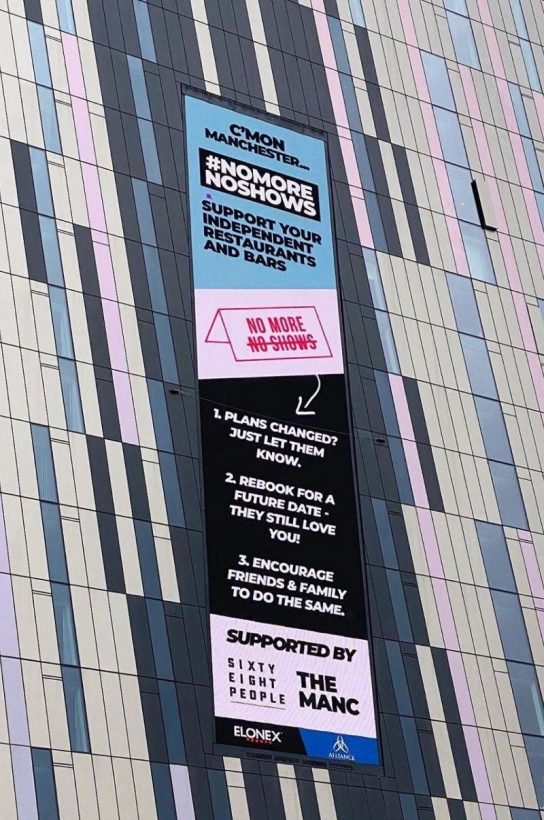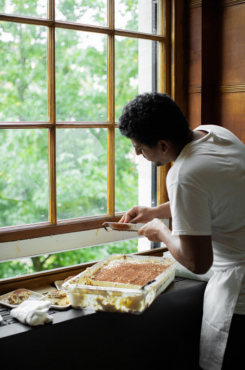The crisis faced by restaurants during and after lockdown threw into stark relief a problem it already had – how to deal with no-shows. Now, more than ever, this selfish and needless habit needs to be stamped out, but is there a one-size-fits-all solution? Chloë Hamilton talks to operators who are at the sharp end
Like a lot of industry people during lockdown I spent time watching – and rewatching – the 1996 cult classic Big Night when it reappeared on Netflix. Charming though it is, the inevitable downward spiral in the plot provokes a feeling of terrible, sinking dread. Unease sets in when Primo goes to buy flowers, and ramps up when they lovingly set to work on the timbales. But it’s not until the party dance around the restaurant in a can-can train, clearly very drunk, that I was forced to acknowledge the star guest – the saviour of their beloved business – was never going to turn up.
Though most of the industry are not waiting in vain for Louis Prima to show, the futile expectation bears an uncanny resemblance to the booked tables sitting painfully empty like a bad omen across the UK. The film’s specific, acute disappointment of loving hospitality wasted is being played out in real life. And so too is the reality that the absence of these guests will push a financially fragile business over a knife edge into the abyss.
Before these bigger names made headlines, Abi Dunn, founder of Manchester recruitment consultancy Sixty Eight People, had already registered what was happening. Antonia Lallement, a candidate Dunn had placed at Italian restaurant group Gusto, shared news of a staggering 270 no-shows in a single day, across nine sites, amounting to around £6k in lost revenue. It prompted the pair to reconnect and take action on behalf of Manchester’s restaurants.
On a shoestring budget – Dunn used £470 of her last £500 – the pair launched the #nomorenoshows campaign, galvanising an extensive industry network in Manchester to participate in a “thunderclap” on social media. Local marketing agency LIT designed the graphic that would be shared in unison to achieve maximum impact on grids and timelines throughout the city. Crucially, the artwork was unbranded and came from Dunn’s position of neutrality. “It would have been much harder, if it was an operator doing it, for other operators to really get behind it,” she explains.
The thunderclap worked. On Thursday 16 July at 10am the campaign launched and in three days the original post amassed 12.5 million Twitter impressions. Dunn reflects on its success: “The timing was perfect. Everyone got behind it – all the Manchester food press and big names in the Manchester hospitality scene like Sacha Lord and Tom Hetherington.” Then when, further afield, Tom Kerridge piped up along with a slew of other high-profile chefs and Jay Rayner shared it she thought, “this is good. This is national”. Indeed the path of the campaign reached as far as Aberdeen, Italy, Cornwall and Dallas.
Media requests came rolling in: BBC Breakfast, Channel 5, ITV. The message of the campaign was to speak directly to consumers to raise awareness of the impact a no-show has, rather than placing the onus on the operator to solve the problem through incurring financial penalties. “We’re not anti-deposit,” says Dunn. “But what might work for Hawksmoor does not necessarily work for your smaller independents. And many operators haven’t currently got the revenue to invest in new systems.”
Nick Gibson of the Drapers Arms concurs with this point of view. “If I have someone calling up to book over the phone during a busy Sunday lunch service, I’m not going to make my staff stand there taking credit card details,” he says. The Islington food pub does not take any credit card details, whether the group size is 10, 30, 60 or 100 people. (“That’s how stupid I am,” laughs Nick). But since reopening he has also suffered enormously from no-shows.
On Saturday in mid July there was a table of 10 who failed to turn up, and on the following Saturday there were 14 no show tables throughout the day, equating to 53 covers. In a reduced capacity dining room this left a gaping hole. “You’re hoping to go somewhere lively but that Saturday we were full upstairs whilst downstairs it was pretty much empty,” says Gibson. “When you don’t show up, you’re also damaging the enjoyment of those who have tables.”
Aside from the data and processing headache of taking a customer’s credit card details, Gibson personally dislikes the discourse around no-shows. “I simply do not want to harass or treat people who are booked in – who have every intention of coming – like they are criminals, with a dialogue that expects them not to show up,” he says. “It’s something I find really uncomfortable. The emotional constitution of the business to me is to welcome people with warmth and kindness and generosity.”
Haz Arshad of Manchester’s much loved Mughli was similarly reluctant to introduce financial penalties until circumstances forced his hand. “I was never a fan of taking deposits in our restaurants but after we began to see an increasing trend of no shows – up to 25% some nights – and when we started to receive calls from customers openly admitting to booking more than one restaurant at the same time just so they had ‘options’, we knew no matter how much we pleaded with them to book responsibly, something needed to be done.” The solution was to introduce a deposit of £5 per person, which Arshad says has undoubtedly deterred some potential customers but is a “necessary evil” given the lack of consideration from a minority of people.
A £5 deposit is a measure Ollie Jones and Gus Houghton of Pizza East are currently debating internally. Their Shoreditch restaurant has a modest average spend per head of £25 and usually relies heavily on walk-in trade to fill gaps left by no-shows. But in a climate where having walk-ins milling around is ill-advised – even queue-famous Dishoom now take bookings – the numbers aren’t adding up. Since reopening, Pizza East has seen single services tally up to 70 last-minute cancellations. Speaking to them on a warm Wednesday afternoon in August, they had already taken 60 cancellations for that evening.
“On OpenTable our policy is quite flexible,” says Houghton. “You just press a button to cancel and it can be half an hour, or even a few minutes before the reservation, which to us is effectively a no-show. And we don’t have any alfresco dining so I can understand if someone’s outdoors at a pub and cancels at the last minute.” The concern is that £5 may not be sufficient to be a deterrent, or conversely it will send potential patrons into the arms of the numerous other pizza restaurants around them in Shoreditch.
Getting the figure right is important. Stevie Parle, who recently launched Flora within the Joy at Portobello complex, had a £10 booking deposit from day one. Joining the stand on Instagram was the mini restaurant group of Primeur, Jolene and Westerns Laundry. Even with a no-show fee of £10 per head already in place they saw a quarter of their revenue wiped out by 12 no-show guests on a Saturday night after reopening. “Under the current conditions it’s virtually impossible to make up for the loss of revenue,” they wrote. And whilst it still won’t compensate for the glaringly empty tables and the knock to team morale, their introduction of a weightier penalty of £50 per head hopes to serve as a stronger deterrent.
Though most things in life seem rosier pre-pandemic, the problem of no shows is certainly not new. Both Nick Gibson and Ollie Jones recall services where they’ve watched tables on their OpenTable interface blinking out like battleships. And there has been a slow but steady shift in consumer understanding of deposits over the past few years. But the reality now is that every single person not showing up to their table in a reduced-capacity dining room has a much bigger impact on the bottom line.
The argument cited by many that people wanting theatre tickets, seats at a sporting event or space at a festival pay in advance with no grumbles doesn’t seem to be fully translatable to restaurant bookings. It is baffling to many in hospitality – surely it’s clear that there are staff in place, food has been purchased and so on? The success of the small number of restaurants with the pre-paid Tock system – such as The Clove Club – could suggest change, even if it is at a glacial pace.
It finds the industry in a renewed search for answers as to why guests are behaving in this way, knowing, or at least vaguely aware, that the hospitality industry is in dire straits. Which is why Dunn’s consumer facing campaign is so important. Even now the #nomorenoshows hashtag is still going strong, trickling into smaller UK cities. But the conversation must continue until there is a greater, more widespread understanding that if these guests don’t turn up to their booking, the restaurant will not be there to go back to.
To read more articles from the latest edition of the CODE Quarterly, click here


